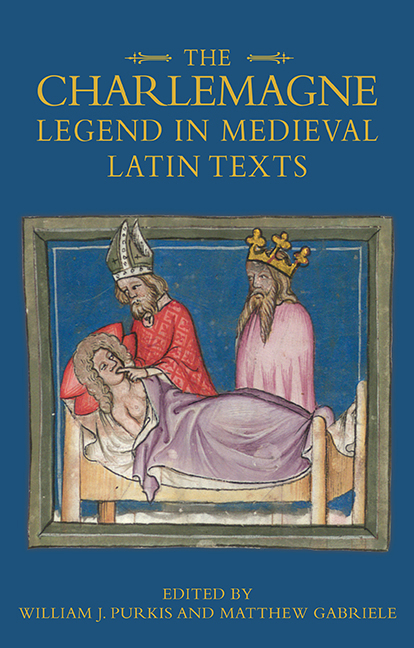Book contents
- Frontmatter
- Dedication
- Contents
- List of Illustrations
- Contributors
- General preface Charlemagne: A European Icon
- Acknowledgements
- List of Abbreviations
- Introduction The Many Latin Lives of Charlemagne
- 1. Frankish Kingship, Political Exegesis and the Ghost of Charlemagne in the Diplomas of King Philip I of Francia
- 2. The Twelfth-Century Vita Karoli and the Making of a Royal Saint
- 3. Performing Sacrality: The Liturgical Portrait of Frederick Barbarossa's Charlemagne
- 4. Rex Parvus or Rex Nobilis? Charlemagne and the Politics of History (and Crusading) in Thirteenth-Century Iberia
- 5. Charlemagne in Girona: Liturgy, Legend and the Memory of Siege
- 6. ‘For the Honour of the Blessed Virgin’: The History and Legacy of Charles's Devotion to Mary in the Gesta Karoli Magni ad Carcassonam et Narbonam
- 7. Charlemagne the Sinner: Charles the Great as Avatar of the Modern in Petrarch's Familiares 1.4
- 8. The Quattrocento Charlemagne: Franco–Florentine Relations and the Politics of an Icon
- Index
- Miscellaneous Endmatter
7. - Charlemagne the Sinner: Charles the Great as Avatar of the Modern in Petrarch's Familiares 1.4
Published online by Cambridge University Press: 25 October 2017
- Frontmatter
- Dedication
- Contents
- List of Illustrations
- Contributors
- General preface Charlemagne: A European Icon
- Acknowledgements
- List of Abbreviations
- Introduction The Many Latin Lives of Charlemagne
- 1. Frankish Kingship, Political Exegesis and the Ghost of Charlemagne in the Diplomas of King Philip I of Francia
- 2. The Twelfth-Century Vita Karoli and the Making of a Royal Saint
- 3. Performing Sacrality: The Liturgical Portrait of Frederick Barbarossa's Charlemagne
- 4. Rex Parvus or Rex Nobilis? Charlemagne and the Politics of History (and Crusading) in Thirteenth-Century Iberia
- 5. Charlemagne in Girona: Liturgy, Legend and the Memory of Siege
- 6. ‘For the Honour of the Blessed Virgin’: The History and Legacy of Charles's Devotion to Mary in the Gesta Karoli Magni ad Carcassonam et Narbonam
- 7. Charlemagne the Sinner: Charles the Great as Avatar of the Modern in Petrarch's Familiares 1.4
- 8. The Quattrocento Charlemagne: Franco–Florentine Relations and the Politics of an Icon
- Index
- Miscellaneous Endmatter
Summary
The appellation of great has been often bestowed, and sometimes deserved; but Charlemagne is the only prince in whose favour the title has been indissolubly blended with the name. That name, with the addition of saint, is inserted in the Roman calendar; and the saint, by a rare felicity, is crowned with the praises of the historians and philosophers of an enlightened age. His real merit is doubtless enhanced by the barbarism of the nation and the times from which he emerged: but the apparent magnitude of an object is likewise enlarged by an unequal comparison; and the ruins of Palmyra derive a casual splendour from the nakedness of the surrounding desert. Without injustice to his fame, I may discern some blemishes in the sanctity and greatness of the restorer of the Western empire. Of his moral virtues, chastity is not the most conspicuous: but the public happiness could not be materially injured by his nine wives or concubines, the various indulgence of meaner or more transient amours, the multitude of his bastards whom he bestowed on the church, and the long celibacy and licentious manners of his daughters, whom the father was suspected of loving with too fond a passion.
Edward Gibbon, History of the Decline and Fall of the Roman Empire 49.4 (1782)They recount that King Charles, whom they dare equate to Pompey and Alexander by giving him the surname of ‘the Great’, loved a certain ordinary woman desperately and immoderately.
Francesco Petrarch, Letters on Familiar Matters 1.4 (written c. 1333, published 1364)WHEN the esteemed eighteenth-century English historian Edward Gibbon wrote condescendingly of Charlemagne's legendary renown in his epic History of the Decline and Fall of the Roman Empire, he must have known that he was echoing opinions penned by the famous Italian poet and scholar Francis Petrarch some four and half centuries earlier. Gibbon wrote that Charlemagne may indeed have been the greatest of his era, but this was only because his era had itself been something of a wasteland. Charlemagne was rather like the ruins of ancient Palmyra, which obtained their lustre only by standing out in stark relief against the surrounding bleakness of the Syrian desert.
- Type
- Chapter
- Information
- The Charlemagne Legend in Medieval Latin Texts , pp. 181 - 202Publisher: Boydell & BrewerPrint publication year: 2016



